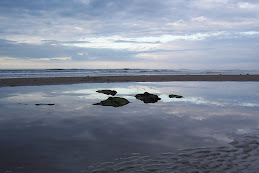Phenomenological psychologist Moustakas talks about “indwelling”, the “turning inward to seek a deeper, more extended comprehension of the nature or meaning of a quality or theme of human experience.” In some senses we are waiting, yet it is not an inactive, lethargic waiting. We are attentive, something is going on in us; but it is below the surface, we are not fully aware of it, at times it appears to be not of our own volition. ...
What is happening behind our most accessible thoughts is where the action is. And once primed the waiting-muse will continue to whirr away in the background, making connections, dreaming up new perspectives and different ways into the issue that we are examining. That’s if we allow it to, are attentive without being impatient and are offering nourishment without insisting it produce.
For me the waiting-muse requires physical exercise - a walk or a swim. How often do I think of where to go next with my writing when I am back-crawling a length of the pool?
Apparently Wilfred Owen also experienced the need for a lull for his poetry to bloom. In the biography I am reading at the moment by Dominic Hibberd, Owen is quoted as saying that a poem can not 'grow by jerks' but must develop 'naturally as leaves to a tree'. A process which requires time and feeding but cannot be forced.

